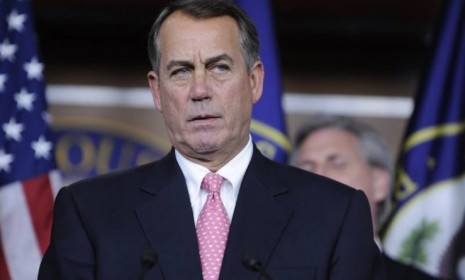Why John Boehner wants another debt ceiling showdown: 5 theories
The House Speaker seems to be relishing the possibility of reliving the awful debt-ceiling drama of 2011 come December

A free daily email with the biggest news stories of the day – and the best features from TheWeek.com
You are now subscribed
Your newsletter sign-up was successful
After House Speaker John Boehner (R-Ohio) vowed on Tuesday to block an increase in the federal debt ceiling unless Democrats agreed to steep spending cuts, he and other GOP congressional leaders met with their Democratic counterparts and President Obama at the White House. If the hope of the meeting was to head off "a reprise of last year's nasty showdown over raising the federal debt limit," say Reuters' David Lawder and Jeff Mason, things "are not off to a good start." According to his aides, Boehner repeated his threat to Obama. Given the potential political and economic carnage from another standoff, why is Boehner so apparently eager to tee up this fight? Here, five theories:
1. His caucus demands it
Boehner's push for a big debt-ceiling fight "was almost certainly conceived in the same cramped box his unruly conference has kept him in since the first day of his speakership," says Brian Beutler at Talking Points Memo. The sizable Tea Party faction of his caucus has never trusted him, and they're "still bloodthirsty" from when he tried to cut a deal with Obama last summer. "If Boehner's fighting for his speakership, this is a way to make a final appeal to the radicals in his party."
The Week
Escape your echo chamber. Get the facts behind the news, plus analysis from multiple perspectives.

Sign up for The Week's Free Newsletters
From our morning news briefing to a weekly Good News Newsletter, get the best of The Week delivered directly to your inbox.
From our morning news briefing to a weekly Good News Newsletter, get the best of The Week delivered directly to your inbox.
2. It reinforces the GOP's election-year pitch
Boehner is pushing the fight now, essentially ensuring it will happen, because the issues the debt ceiling raises — federal spending, the national debt, Obama's fiscal stewardship — "happen to be the issues that [the GOP is] campaigning on," says Doug Mataconis at Outside the Beltway. This is also Boehner's only real leverage to keep the Bush-era tax cuts for high earners, set to expire on Dec. 31. He's saying that if "you believe that taxes are a critical tool for putting the budget in balance... we have nothing to talk about," says Gail Collins at The New York Times. So "meet you in November."
3. Boehner thinks Romney will lose
Angling for a post-election fight isn't much of a vote of confidence by Boehner in his party's presidential nominee, says Talking Point Memo's Beutler. Pushing the country to the brink of default is potentially "deadly politics," and if Republicans felt good about the their chances to retake the White House, "why would they want to create a huge, unnecessary mess for Mitt Romney?" My bet: They wouldn't.
A free daily email with the biggest news stories of the day – and the best features from TheWeek.com
4. It's effective...
The only surprise here is that anyone thought Boehner's "2011 debt-ceiling antics were some sort of one-off," says Ezra Klein at The Washington Post. Of course he's going to try this again — "it worked so well for him" last time. The GOP got huge, economy-slowing spending cuts, and the standoff "drove President Obama's approval ratings beneath 40 percent." This was such an effective weapon that until somebody pays a price for wielding it, "there's no going back to the time when debt-ceiling increases came smoothly."
5. ...And he paid no real cost for the standoff
There's the rub, says Aaron Blake at The Washington Post. Last summer's brinkmanship was terrible for the federal government, and it wreaked havoc on the approval ratings of both Congress and Obama, but nobody "underwent irreparable harm." Eight months later, it's clear from the polls that "neither side squandered its chances in the 2012 election; each side paid a price, and each has a fair shot at victory this year." So buckle up, it's going to be a bumpy winter.